YM 3.4 - The Moral Dimension
First airtime BBC: 2 December 1982
Length: 30 minutes
| Cast | Crew | |||
| Jim Hacker MP | Paul Eddington | Properties buyer | Bob Sutton | |
| Sir Humphrey Appleby | Nigel Hawthorne | Assistant floor manager | Lydia Frankenburg | |
| Bernard Woolley | Derek Fowlds | Studio lighting | John Dixon | |
| Annie Hacker | Diana Hoddinott | Costume designer | Judy Allen | |
| Bill Pritchard | Antony Carrick | Make-up artist | Toni Chapman | |
| Jenny Goodwin | April Walker | Senior Cameraman | Peter Ware | |
| Qumrani businessman | Sam Dastor | Video tape editor | John Sillitto | |
| Prince Mohammed | Vic Tablian | Vision mixer | Shirley Coward | |
| Qumrani man | Walter Randall | Studio sound | Malcolm Johnson | |
| Ross | Michael Sharvell-Martin | Music | Ronnie Hazlehurst | |
| Title sequence | Gerald Scarfe | |||
| Production assistant | Lesley Langan | |||
| Production manager | Brian Jones | |||
| Designer | Andrée Welstead Hornby | |||
| Producer | Peter Whitmore | |||
| Writers | Antony Jay & Jonathan Lynn | |||
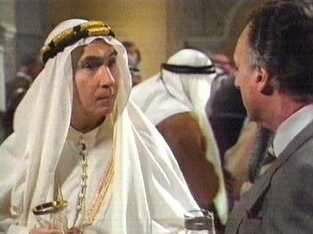 Plot: Jim Hacker and a huge delegation of civil servants are traveling to Qumran, an oil-rich country. There he is going to sign a huge export order for British Electronic Systems (BES). In the airplane Sir Humphrey and Jim Hacker discuss the trip. Jim Hacker learns that due to Islamic law, there will be no alcoholic beverages during the reception (5 hours of orange juice instead!). Dreaded with this prospect, Jim Hacker suggests to set up a security communications room filled with booze brought in from the British Embassy. This will surely lighten up the orange juice. Sir Humphrey is very enthusiastic about this suggestion and promises to make the necessary arrangements.
Plot: Jim Hacker and a huge delegation of civil servants are traveling to Qumran, an oil-rich country. There he is going to sign a huge export order for British Electronic Systems (BES). In the airplane Sir Humphrey and Jim Hacker discuss the trip. Jim Hacker learns that due to Islamic law, there will be no alcoholic beverages during the reception (5 hours of orange juice instead!). Dreaded with this prospect, Jim Hacker suggests to set up a security communications room filled with booze brought in from the British Embassy. This will surely lighten up the orange juice. Sir Humphrey is very enthusiastic about this suggestion and promises to make the necessary arrangements.
During the reception Jim Hacker receives a gift from the Qumran government: a 17th century rosewater jar. Annie Hacker really likes the jar, but Bernard explains to her that the Minister is not allowed to keep this gift if it is worth more than fifty pounds. Annie states that she hopes it is worth less than fifty pounds, and then looks strangely at Bernard.
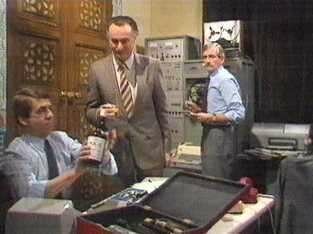 In the meanwhile, Jim Hacker is getting a lot of messages in the security communication room: from Mr. Haig, Mr. John(nie) Walker, Mr. Smirnoff, Teachers, etc. He rapidly has received about as many messages as he can take.
In the meanwhile, Jim Hacker is getting a lot of messages in the security communication room: from Mr. Haig, Mr. John(nie) Walker, Mr. Smirnoff, Teachers, etc. He rapidly has received about as many messages as he can take.
Bernard bumps into a Qumrani Official who overheard the conversation between Annie and Bernard, and he offers to help in valuing the rosewater jar. He values it as a copy and worth just below fifty pounds. Bernard is very pleased with his help. The Official then states his surprise about how strict the British are about a gift, while on the other hand they pay a million dollars for co-operation in securing the contract. Bernard is astonished about this and he runs off to Sir Humphrey to tell him. Sir Humphrey however knows about the bribery and he forbids Bernard to tell Jim Hacker.
Back in Britain and at the DAA Jim Hacker learns about the bribery allegations with the BES contract from the paper. Jim Hacker asks Sir Humphrey whether this is true, but Sir Humphrey advises Hacker not to ask him directly. Jim Hacker is appalled to learn about the bribery and announces that 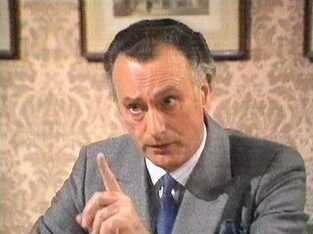 if the press or the House asks him about it, he will set up an outside inquiry. Sir Humphrey pleads to keep in mind all the British jobs that are put to risk by this. But Jim Hacker is determined and reminds Sir Humphrey of the moral dimension of politics.
if the press or the House asks him about it, he will set up an outside inquiry. Sir Humphrey pleads to keep in mind all the British jobs that are put to risk by this. But Jim Hacker is determined and reminds Sir Humphrey of the moral dimension of politics.
Later on that evening when Bernard comes to Jim Hacker's home, Annie Hacker tells him that a journalist friend was frightfully interested in the rosewater jar from Qumran. Annie told her that it was a copy worth less than fifty pounds, but the journalist wanted to check this with the Qumrani Embassy. Bernard now gets very nervous. Back at the DAA he decides to tell Sir Humphrey about this. Sir Humphrey tells Bernard to inform the Minister.
When Jim Hacker learns about the whole rosewater jar story he is outraged how Bernard could have put him in this position. The journalist is outside demanding to see the Minister. Jim Hacker announces he will tell the truth about the bribery and the rosewater jar: the moral dimension. Sir Humphrey agrees fully that there is a 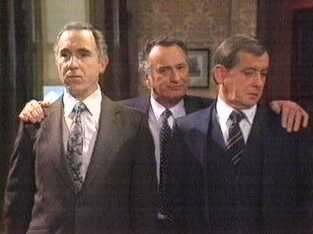 moral dimension. He asks whether Jim Hacker will tell the press about Jim's idea for a security communications room in Qumran or shall he? Sir Humphrey is "wrecked with guilt" about the deception of the Qumranis. Jim Hacker has no choice: he must either confess everything or deny everything.
moral dimension. He asks whether Jim Hacker will tell the press about Jim's idea for a security communications room in Qumran or shall he? Sir Humphrey is "wrecked with guilt" about the deception of the Qumranis. Jim Hacker has no choice: he must either confess everything or deny everything.
When Jenny Goodwin of the Guardian finally sees Jim Hacker, he immediately goes into attack. She asks about the bribery allegation of the BES contract and Jim Hacker furiously accuses the press of launching a smear campaign. He denies the bribery and threatens to censor the press. Jenny Goodwin then turns the topic to the rosewater jar. Jim Hacker tells her that he is keeping it temporarily at his home to present it to his constituency's museum over the weekend. He also points out that Annie Hacker is telling everyone it is a copy and worth just fifty pounds to prevent burglary. Then he asks her what her question was, but she is finished and leaves the office. Sir Humphrey applauds the Minister for his superb performance.
Rating (0-10): 10
Top 5 Quotes:
 [Sir Humphrey explaining why he is dressed as an Arab at the Qumrani reception]
[Sir Humphrey explaining why he is dressed as an Arab at the Qumrani reception]
Sir Humphrey: "The Foreign Office takes the view that as the Arab nations are a very sensitive people that we should show them who's side we're on."
Jim Hacker: "Well it may come as a surprise to the Foreign Office, but you are supposed to be on our side." Jim Hacker: "Are you saying that winking at corruption is government policy?"
Jim Hacker: "Are you saying that winking at corruption is government policy?"
Sir Humphrey: "No, no, Minister. It could never be government policy. That is unthinkable. Only government practice." Jim Hacker: "Will you answer a direct question?"
Jim Hacker: "Will you answer a direct question?"
Sir Humphrey: "I strongly advise you not to ask a direct question."
Jim Hacker: "Why?"
Sir Humphrey: "It might provoke a direct answer."
Jim Hacker: "It never has yet." Jim Hacker: "But this [communiqué] may bear no relation to what we actually say."
Jim Hacker: "But this [communiqué] may bear no relation to what we actually say."
Sir Humphrey: "No communiqué ever bears any relation to what you actually say."
Jim Hacker: "Why have one?"
Sir Humphrey: "Sort of exit visa; gets you past the press corps." Jim Hacker: "It is not like the Financial Times to print a [bribery] story like this unless there is something behind it. Is there something behind it, Humphrey?"
Jim Hacker: "It is not like the Financial Times to print a [bribery] story like this unless there is something behind it. Is there something behind it, Humphrey?"
Bernard Woolley: "I think sports news is behind it."
YM 3.5 - The Bed of Nails
First airtime BBC: 9 December 1982
Length: 30 minutes
| Cast | Crew | |||
| Jim Hacker MP | Paul Eddington | Properties buyer | Bob Sutton | |
| Sir Humphrey Appleby | Nigel Hawthorne | Assistant floor manager | Lydia Frankenburg | |
| Bernard Woolley | Derek Fowlds | Studio lighting | John Dixon | |
| Sir Arnold Robinson | John Nettleton | Costume designer | Judy Allen | |
| Sir Mark Spencer | Nigel Stock | Make-up artist | Toni Chapman | |
| Undersecretary Air Division | David Firth (?) | Senior Cameraman | Peter Ware | |
| Undersecretary Roads Division | Peter Dennis | Video tape editor | Ian Williams | |
| Undersecretary Rail Division | Robert East | Vision mixer | Bill Morton | |
| Peter Maxwell | David Rose (?) | Studio sound | Malcolm Johnson | |
| Music | Ronnie Hazlehurst | |||
| Title sequence | Gerald Scarfe | |||
| Production assistant | Lesley Langan | |||
| Production manager | Brian Jones | |||
| Designer | Gary Pritchard | |||
| Producer | Peter Whitmore | |||
| Writers | Antony Jay & Jonathan Lynn | |||
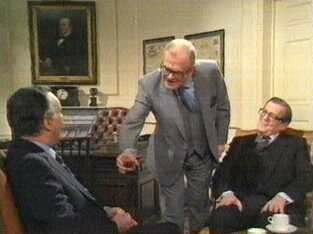 Plot: Sir Mark and Sir Arnold have decided to ask Jim Hacker to formulate and implement an Integrated National Transport Policy. As they do not want Sir Humphrey to interfere, they ask Jim Hacker for immediate acceptance of this task. Jim Hacker is delighted being asked and accepts eagerly. He expects to become very popular with the voters through this policy.
Plot: Sir Mark and Sir Arnold have decided to ask Jim Hacker to formulate and implement an Integrated National Transport Policy. As they do not want Sir Humphrey to interfere, they ask Jim Hacker for immediate acceptance of this task. Jim Hacker is delighted being asked and accepts eagerly. He expects to become very popular with the voters through this policy.
When he brings Sir Humphrey the good news of being promoted to Transport Supremo, Sir Humphrey does not share his enthusiasm. In fact, Sir Humphrey tells him that it is the ultimate vote-loser. The Transport Supremo appointment has been swirling through Whitehall for weeks with everyone recommending someone else to take it on. Sir Humphrey further explains that the policy is in everyone's interest except the one who creates it. Formulating this policy means making choices and by this you infuriate those you do not favour. It comes down to one vote gained and ten votes lost. Jim Hacker is however not convinced by Sir Humphrey's arguments, so Sir Humphrey promises to set up a preliminary meeting with three Undersecretaries from the Department of Transport.
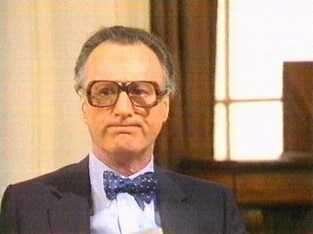 The meeting with the Undersecretaries shows Jim Hacker what he is up against. The three Undersecretaries are promoting their own division (road, rail and air transport) and at the same time are heavily combating each other. After the meeting Bernard explains that each Undersecretary acts as a representative of the industry they make policy for. Jim Hacker realises that he does not want to be Transport Supremo any longer.
The meeting with the Undersecretaries shows Jim Hacker what he is up against. The three Undersecretaries are promoting their own division (road, rail and air transport) and at the same time are heavily combating each other. After the meeting Bernard explains that each Undersecretary acts as a representative of the industry they make policy for. Jim Hacker realises that he does not want to be Transport Supremo any longer.
With Sir Humphrey, he cooks up a plan to get rid off the appointment. They draw up a note which informs the Cabinet of the negative implications of the Integrated National Transport Policy, especially for the Prime Minister's constituency. It sketches job loss, commuters paying full economic fares, building a container lorry park and reduction of bus services. Sir Humphrey leaks this note to a reporter from the Times.
Sir Mark - Chief Special Advisor to the PM - summons Jim Hacker to the Prime Ministers Office and tells him that the PM is not pleased. He shows an article in the PM's local constituency paper that reports on a confidential note from the PM blocking Jim Hacker's plans. Sir Mark tells Jim Hacker to rethink the Integrated National Transport Policy.
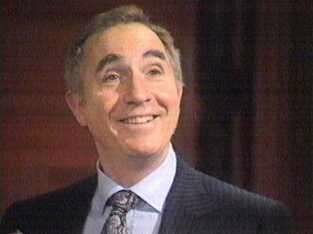 Sir Humphrey now proposes to submit a high-cost high-staff plan to the Cabinet: a British National Transport Authority with a staff of 80,000 and a budget of one billion pounds. This time Jim Hacker will leak the plan to the press. Bernard wonders whether they will not set up a leak enquiry, but Sir Humphrey and Jim Hacker are not worried about this. None of the leak enquiries in the past has ever identified the culprit.
Sir Humphrey now proposes to submit a high-cost high-staff plan to the Cabinet: a British National Transport Authority with a staff of 80,000 and a budget of one billion pounds. This time Jim Hacker will leak the plan to the press. Bernard wonders whether they will not set up a leak enquiry, but Sir Humphrey and Jim Hacker are not worried about this. None of the leak enquiries in the past has ever identified the culprit.
In a meeting of Sir Humphrey, James Hacker, Sir Mark and Sir Arnold the status of the Transport Policy is discussed. Sir Mark is worried about all these leaks and suggests that he may be able to find out who leaked the first note to the Times. Jim Hacker now suggests he may be able to find out who leaked the PM's confidential note. Everyone in the meeting now gets very nervous. Sir Arnold finally suggests to relocate the responsibility for the Integrated National Transport Policy back to the Department of Transport. Sir Humphrey and Jim Hacker fully agree that this is the best solution. And regarding the question of the leaks: Jim Hacker recommends to set up a leak enquiry.
Rating (0-10): 8
Top 5 Quotes:
 Jim Hacker: "Sir Mark thinks there maybe votes in it. And if so, I don't intend to look a gift horse in the mouth."
Jim Hacker: "Sir Mark thinks there maybe votes in it. And if so, I don't intend to look a gift horse in the mouth."
Sir Humphrey: "I put it to you, Minister, that you are looking a Trojan Horse in the mouth."
Jim Hacker: "If we look closely at this gift horse, we'll find it's full of Trojans?"
Bernard Woolley: "If you had looked a Trojan Horse in the mouth, Minister, you would have found Greeks inside. Well the point is that it was the Greeks that gave the Trojan Horse to the Trojans, so technically it wasn't a Trojan Horse at all, it was a Greek Horse. Hence the tag Timeo Danaos et dona ferentes which you recall is usually, and somewhat inaccurately translated as Beware of Greeks bearing gifts. Or doubtless you would have recalled had you not attended the LSE. [...] No well, the point is, Minister, that just as the Trojan Horse was in fact Greek, what you describe as a Greek tag is in fact Latin. It's obvious really, the Greeks would never suggest bewaring of themselves if one used such a participle, bewaring that is, and it is clearly Latin, not because Timeo ends in 'o', because the Greek first person also ends in 'o'. Though actually, there is a Greek word called Timao meaning I honour. But the 'os' ending is a nominative singular termination of the second declension in Greek, and an accusative plural in Latin of course, though actually Danaos is not only the Greek for Greek but also the Latin for Greek, it is very interesting really." Jim Hacker: "But if I succeed, this could be my Falkland Islands."
Jim Hacker: "But if I succeed, this could be my Falkland Islands."
Sir Humphrey: "And you could be General Galtieri." Jim Hacker: "Clearly, the title Transport Supremo is one that is not worth having. We must endeavor to change the Prime Minister's mind."
Jim Hacker: "Clearly, the title Transport Supremo is one that is not worth having. We must endeavor to change the Prime Minister's mind."
Sir Humphrey: "Do you mean 'we' plural or do Supremos now use the royal pronoun?" Jim Hacker: "And after all, we do need a Transport Policy."
Jim Hacker: "And after all, we do need a Transport Policy."
Sir Humphrey: "If by 'we' you mean Britain that is perfectly true, but if by 'we' you mean me and you and this department, we need a Transport Policy like an aperture in the cranial cavity." Sir Humphrey: "The ship of state, Bernard, is the only ship that leaks from the top."
Sir Humphrey: "The ship of state, Bernard, is the only ship that leaks from the top."
YM 3.6 - The Whisky Priest
First airtime BBC: 16 December 1982
Length: 30 minutes
| Cast | Crew | |||
| Jim Hacker MP | Paul Eddington | Properties buyer | Bob Sutton | |
| Sir Humphrey Appleby | Nigel Hawthorne | Assistant floor manager | Lydia Frankenburg | |
| Bernard Woolley | Derek Fowlds | Studio lighting | John Dixon | |
| Vic Gould (Chief Whip) | Edward Jewesbury | Costume designer | Judy Allen | |
| Annie Hacker | Diana Hoddinott | Make-up artist | Toni Chapman | |
| Major Saunders | John Fortune | Senior Cameraman | Peter Ware | |
| Video tape editor | Chris Wadsworth | |||
| Vision mixer | John Barclay | |||
| Studio sound | Malcolm Johnson | |||
| Music | Ronnie Hazlehurst | |||
| Title sequence | Gerald Scarfe | |||
| Production assistant | Lesley Langan | |||
| Production manager | Brian Jones | |||
| Designer | Andrée Welstead Hornby | |||
| Producer | Peter Whitmore | |||
| Writers | Antony Jay & Jonathan Lynn | |||
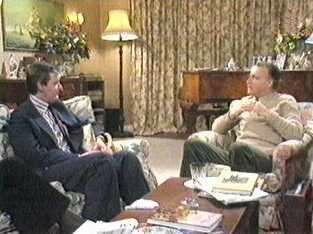 Plot: Jim Hacker receives a visit at his home from Major Saunders. This army officer informs Jim Hacker of some disturbing news: a computerized bomb which is produced in Britain was discovered among Italian terrorists. But because Major Saunders cannot report this officially he tells Jim Hacker about it, so he can start an official investigation. Jim Hacker promises to immediately look into this.
Plot: Jim Hacker receives a visit at his home from Major Saunders. This army officer informs Jim Hacker of some disturbing news: a computerized bomb which is produced in Britain was discovered among Italian terrorists. But because Major Saunders cannot report this officially he tells Jim Hacker about it, so he can start an official investigation. Jim Hacker promises to immediately look into this.
The next day Jim Hacker tells Sir Humphrey this shocking news. Sir Humphrey however is not impressed or shocked. He regards it as somebody else's problem (Department of Trade, Foreign Office, etc.) and recommends not to do anything. Jim Hacker however is determined and announces he will tell the Prime Minister about it.
Sir Humphrey wants to stop his Minister from telling the Prime Minister about this. Together with Bernard Woolley he devises a plan. They will arrange for the Minister to end up seeing the Chief Whip, instead of the Prime Minister.
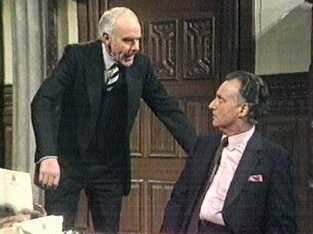 When Jim Hacker arrives at the PM's office he is met by the Chief Whip for a preliminary discussion. He tells the Chief Whip what he has learned and asks for an investigation. The Chief Whip becomes furious at this suggestion. He accuses Jim Hacker of jeopardizing government policy and the government itself. He views the computerized bomb incident as trivial and not worth any attention. He also tells Jim Hacker that it will damage his career if he proceeds on this, just at the time when the PM was thinking about Jim Hacker as Foreign Secretary. Jim Hacker, now a bit frightened, backs down and agrees that it is not worth investigating in the light of the greater good and better not to tell the PM.
When Jim Hacker arrives at the PM's office he is met by the Chief Whip for a preliminary discussion. He tells the Chief Whip what he has learned and asks for an investigation. The Chief Whip becomes furious at this suggestion. He accuses Jim Hacker of jeopardizing government policy and the government itself. He views the computerized bomb incident as trivial and not worth any attention. He also tells Jim Hacker that it will damage his career if he proceeds on this, just at the time when the PM was thinking about Jim Hacker as Foreign Secretary. Jim Hacker, now a bit frightened, backs down and agrees that it is not worth investigating in the light of the greater good and better not to tell the PM.
At his home he defends this decision before his wife Annie. She however points out that it is still wrong to sell arms to terrorists. Furthermore she shows him a letter from Major Saunders that arrived that day. In the letter Major Saunders thanks Jim Hacker for seeing him about this British computerized bomb among Italian terrorists, and that he is confident Jim Hacker will act on this information.
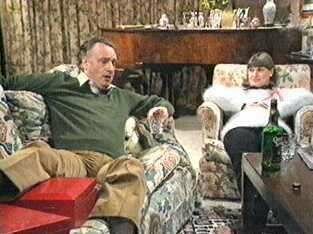 Jim Hacker is now trapped: he cannot tell the PM and he cannot plead he knew nothing of the computerized bomb. At the DAA Bernard Woolley comes up with a brilliant idea: the Rhodesia-solution. He advises Jim Hacker to write a very vague letter to the PM that could easily be misinterpreted. The letter should not refer to terrorists or illegal delivery of arms, but only point to the appropriate section in the law. Furthermore, the letter should be delivered at the day the PM is leaving for a foreign meeting, so it will be unclear who got the letter (the PM or the acting PM). So if it comes out the whole thing can be attributed to miscommunication and everyone is in the clear.
Jim Hacker is now trapped: he cannot tell the PM and he cannot plead he knew nothing of the computerized bomb. At the DAA Bernard Woolley comes up with a brilliant idea: the Rhodesia-solution. He advises Jim Hacker to write a very vague letter to the PM that could easily be misinterpreted. The letter should not refer to terrorists or illegal delivery of arms, but only point to the appropriate section in the law. Furthermore, the letter should be delivered at the day the PM is leaving for a foreign meeting, so it will be unclear who got the letter (the PM or the acting PM). So if it comes out the whole thing can be attributed to miscommunication and everyone is in the clear.
Although the whole matter is solved, Jim Hacker still feels he did the wrong thing. Annie Hacker points out that he at least still has his sense of right and wrong, unlike Sir Humphrey. She says he is like a whisky priest. And Jim Hacker drinks to that.
Rating (0-10): 7
Top 5 Quotes:
 Sir Humphrey: "My job is to carry out government policy."
Sir Humphrey: "My job is to carry out government policy."
Jim Hacker: "Even if you think it is wrong?"
Sir Humphrey: "Well, almost all government policy is wrong, but...frightfully well carried out." Jim Hacker: "But you told me that you were telling me on a personal level?"
Jim Hacker: "But you told me that you were telling me on a personal level?"
Major Saunders: "Yes, but now you know personally, even if you do not know officially you can use your personal knowledge to start official investigations to get official confirmation of personal suspicions, so that what your now know personally, but not officially, you will than know officially as well as personally."
Jim Hacker: "You're not related to Sir Humphrey Appleby by any chance?" Jim Hacker: "Would you be surprised, for instance, if a British aircraft carrier turned up in the Central African Republic?"
Jim Hacker: "Would you be surprised, for instance, if a British aircraft carrier turned up in the Central African Republic?"
Sir Humphrey: "Well, I for one, Minister, would be very surprised; it's a 1,000 miles inland." Jim Hacker: "Remember Churchill, the wilderness years. He found out about our military inadequacy and Hitler's war machine from army officers. So all the time he was in the wilderness, he was able to leak stories to the press and embarrass the government. I could do that."
Jim Hacker: "Remember Churchill, the wilderness years. He found out about our military inadequacy and Hitler's war machine from army officers. So all the time he was in the wilderness, he was able to leak stories to the press and embarrass the government. I could do that."
Annie Hacker: "But you're in the government."
Jim Hacker: "Oh, yes..." Jim Hacker: "So, is this [conversation] highly confidential?"
Jim Hacker: "So, is this [conversation] highly confidential?"
Major Saunders: "Well it is rather, yes."
Jim Hacker: "Shall I turn on the radio?"
Major Saunders: "Why? Is there something good on?"
YM 3.7 - The Middle-Class Rip-Off
First airtime BBC: 23 December 1982
Length: 30 minutes
| Cast | Crew | |||
| Jim Hacker MP | Paul Eddington | Technical manager | John Dean | |
| Sir Humphrey Appleby | Nigel Hawthorne | Properties buyer | Bob Sutton | |
| Bernard Woolley | Derek Fowlds | Assistant floor manager | Lydia Frankenburg | |
| Sir Arnold Robinson | John Nettleton | Studio lighting | John Dixon | |
| Sir Ian Whitchurch | John Barron | Costume designer | Judy Allen | |
| Brian Wilkinson | Patrick O'Connell | Make-up artist | Jenny Hughes | |
| Aston Wanderers board member | Derek Benfield | Cameraman | Reg Pope | |
| Film Editor | John Dunstan | |||
| Video tape editor | Chris Booth | |||
| Vision mixer | Bill Morton | |||
| Film Sound | Bill Wild | |||
| Studio sound | Malcolm Johnson | |||
| Music | Ronnie Hazlehurst | |||
| Title sequence | Gerald Scarfe | |||
| Production assistant | Lesley Langan | |||
| Production manager | Brian Jones | |||
| Designer | Gary Pritchard | |||
| Producer | Peter Whitmore | |||
| Writers | Antony Jay & Jonathan Lynn | |||
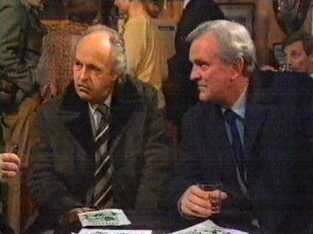 Plot: While visiting his constituency over the weekend, Jim Hacker has a meeting with two board members of the local football club Aston Wanderers. The football club is nearly bankrupt and the board members want Jim Hacker to help out. Jim however does not want to help out directly. When the subject turns to the local art gallery and the offers the council is getting for the site, Jim gets an idea: if the art gallery is sold the money could be used to save Aston Wanderers. Everyone thinks this is a great plan.
Plot: While visiting his constituency over the weekend, Jim Hacker has a meeting with two board members of the local football club Aston Wanderers. The football club is nearly bankrupt and the board members want Jim Hacker to help out. Jim however does not want to help out directly. When the subject turns to the local art gallery and the offers the council is getting for the site, Jim gets an idea: if the art gallery is sold the money could be used to save Aston Wanderers. Everyone thinks this is a great plan.
Well, nearly everyone because Sir Humphrey is outraged by the mere suggestion of taking away money from the arts and putting it into things like football. In a meeting with Jim Hacker he first turns the topic to the news that there is a departmental reorganization at hand. Then he tries to convince Jim Hacker that it is wrong to take away money from the arts, but does not find a willing ear. On the contrary, Jim Hacker views subsidizing art as a middle-class rip-off; it is subsidizing the pleasures of the middle-class (i.e. theatre, opera, ballet). Sir Humphrey has to cut the meeting short however. As it turns out he has to go to the Royal Opera House.
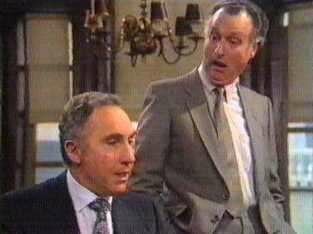 At the Royal Opera House Sir Humphrey has a talk with the Permanent Secretary of the Department of the Environment, Sir Ian Whitworth. One of Sir Ian's planning inspectors has to approve the sale of the art gallery, so Sir Humphrey wants Sir Ian to arrange that some informal guidelines are laid down and the planning inspector chosen is anxious for promotion. Sir Ian is more than happy to help Sir Humphrey out, as he is also appalled by the suggestion to take away money from the arts.
At the Royal Opera House Sir Humphrey has a talk with the Permanent Secretary of the Department of the Environment, Sir Ian Whitworth. One of Sir Ian's planning inspectors has to approve the sale of the art gallery, so Sir Humphrey wants Sir Ian to arrange that some informal guidelines are laid down and the planning inspector chosen is anxious for promotion. Sir Ian is more than happy to help Sir Humphrey out, as he is also appalled by the suggestion to take away money from the arts.
At the department Bernard and Jim go over an amendment to raise the allowances of local council members. Bernard has found out about the deal between Sir Humphrey and Sir Ian, and he informs Jim Hacker about it. He suggests that if a planning inspector were appointed that did not care about promotion because he is about to retire, the inquiry would be independent. Jim Hacker agrees and has a talk with the Parliamentary Secretary at the Department of the Environment.
Lunching with Sir Ian and Sir Arnold, Sir Humphrey explains the situation regarding the art gallery and the new planning inspector that was chosen by the Parliamentary Secretary. Everyone agrees this is rather worrying. Then Sir Humphrey comes up with a solution: if the departmental 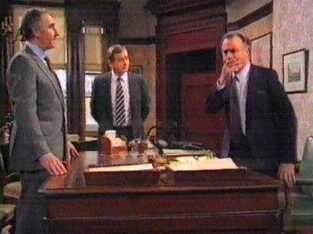 reorganization would move the responsibility for the arts to the DAA, Jim Hacker could hardly go through with his plan to close the art gallery. Sir Arnold thinks this is a good idea.
reorganization would move the responsibility for the arts to the DAA, Jim Hacker could hardly go through with his plan to close the art gallery. Sir Arnold thinks this is a good idea.
Just before the meeting Jim Hacker has with the constituency council members, Sir Humphrey informs him of his new responsibility for the arts. Jim is quite pleased until he realises what it means. As the meeting starts, he claims that because of legal obstacles the whole thing is off. The council members are a bit upset about this and want Jim to keep working on it. Then Bernard points to the amendment of local council member allowances. Jim gets the hint and tells the council members that he might be able to close down the art gallery, but this would mean he could not push through the allowances raise for local council members. The council members get the message and decide it is wisest to leave it at that.
After the meeting Sir Humphrey congratulates Jim Hacker on a true work of art. Sir Humphrey has to go to the Royal Opera House and Jim Hacker now asks if he can join.
Rating (0-10): 8
Top 5 Quotes:
-
 Bernard Woolley: "Now, may I just have your approval for this Local Government Allowances Amendment Number 2 for this year's regulations."
Bernard Woolley: "Now, may I just have your approval for this Local Government Allowances Amendment Number 2 for this year's regulations."
Jim Hacker: "What is it?"
Bernard Woolley: "It is a Statutory Instrument to be laid before the House. As Minister responsible for local government we need you to authorize that the revised Paragraph 5 of Number 2 Regulations 1971 shall come into operation on March the 18th next, revoking Regulation 7 of the Local Government Allowances Amendment Regulations 1954(b)."
Jim Hacker: "What the hell does all that mean?"
Bernard Woolley: "It is all right, there is an explanatory note, Minister. These Regulations are to make provisions for prescribing the amount of attendance and financial loss allowances payable to the members of local authorities. Explanatory note: Regulation 3 of the Local Government Allowances Amendment Regulation 1971 ("the 1971 regulations") substituted a new regulation for Regulation 3 of the 1954 Regulations. Regulation 3 of the Local Government Allowances Amendment Regulation 1972 ("the 1972 regulations") further made amends Regulation 3 of the 1954 Regulations by increasing the maximum rates of attendance and financial loss allowances. Regulation 7 of the 1972 Regulations revoked both regulation 3 and 5 of the 1971 Regulations, Regulation 5 being a regulation revoking earlier spent regulations with the effect from 1st April next. These regulations preserve Regulations 2 and 5 of the 1971 Regulations by revoking Regulation 7 of the 1972 Regulations.
Jim Hacker: "And that's an explanatory note???"  Jim Hacker: "I thought these planning inspectors were supposed to be impartial?"
Jim Hacker: "I thought these planning inspectors were supposed to be impartial?"
Bernard Woolley: "Oh really, Minister. So they are, railway trains are impartial too, but if you lay down the lines for them that's the way they go." Jim Hacker: "Nothing wrong with subsidizing sports: sport is educational."
Jim Hacker: "Nothing wrong with subsidizing sports: sport is educational."
Sir Humphrey: "We have sex education too. Should we subsidize sex perhaps?"
Bernard Woolley: "Could we?" Sir Humphrey: "Bernard, subsidy is for art...for culture. It is not to be given to what the people want, it is for what the people don't want but ought to have."
Sir Humphrey: "Bernard, subsidy is for art...for culture. It is not to be given to what the people want, it is for what the people don't want but ought to have." Sir Humphrey: "When you see vast buildings, huge staff and massive budgets, what do you conclude?"
Sir Humphrey: "When you see vast buildings, huge staff and massive budgets, what do you conclude?"
Jim Hacker: "Bureaucracy?"
